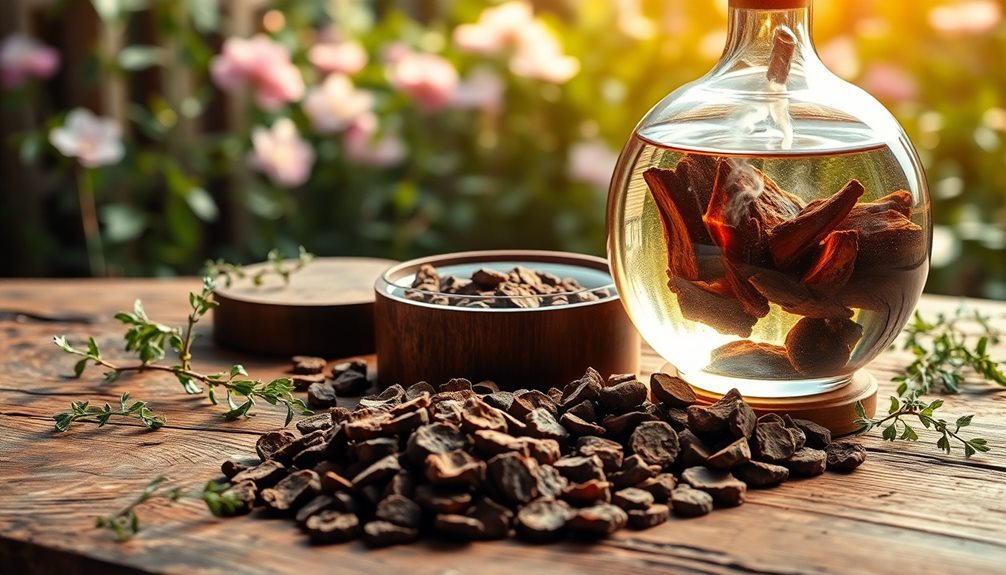Agarwood essential oil is a treasure for your well-being, offering benefits like stress relief, improved digestion, and respiratory support. You can extract its essence through hydro-distillation, ensuring you use high-quality agarwood chips for ideal results. Simply soak them in distilled water, gentle heat, and steam will carry the aromatic compounds into your final oil. For an infusion, blend agarwood with a calming carrier oil like jojoba, allowing it to steep for several hours. The earthy, sweet aroma not only calms your senses but also enhances emotional clarity. Explore more about this ancient remedy for a truly holistic experience.
Summary
- Agarwood essential oil alleviates anxiety and stress, promoting emotional balance and overall mental well-being.
- Hydro-distillation is the preferred extraction method, preserving the oil's fragrance and therapeutic properties.
- High-quality agarwood chips and precise temperature management are crucial for optimal oil extraction.
- Infuse agarwood in carrier oils like jojoba or sweet almond to enhance aroma and therapeutic effects.
- Verify product purity and consult healthcare professionals before topical application for safety.
Traditional Medicinal Applications
Have you ever wondered how traditional medicine harnesses the power of nature? Agarwood, known for its aromatic and therapeutic properties, plays a significant role in this domain. In traditional Chinese medicine, agarwood is revered for its ability to promote the flow of qi and support overall health. It's often used in tinctures and formulations aimed at balancing bodily functions.
Additionally, similar to the calming effects of Palo Santo, agarwood's essential oil is known for its purifying properties, enhancing the overall wellness experience.
When it comes to respiratory issues, agarwood shines. Its natural compounds help clear congestion and soothe the airways, making it a go-to remedy for those suffering from asthma or bronchitis. You'll find that incorporating agarwood in your wellness routine can enhance your respiratory health and deepen your breath.
Moreover, its benefits extend beyond respiratory support. Agarwood is utilized in various traditional practices to relieve pain, combat anxiety, and even address digestive concerns.
This holistic approach shows how agarwood isn't just a fragrant delight; it's a versatile ally in your journey towards wellness. So, the next time you explore natural remedies, consider the profound impact of agarwood in traditional medicine and its potential to enhance your well-being.
Historical Medicinal Uses Documented
Throughout history, cultures across Asia have documented the remarkable medicinal uses of agarwood, showcasing its significance in traditional healing practices. Its essential oil, known for promoting relaxation and emotional balance, has been integrated into various remedies.
You've probably heard of agarwood's reputation as a powerful remedy, particularly in Ayurvedic medicine, where it's been used for centuries to treat various ailments. Its calming properties make it a go-to for addressing nervous system disorders. When you inhale its soothing aroma, you might find relief from anxiety and stress, promoting a sense of tranquility.
In Ayurvedic traditions, agarwood is cherished for its ability to balance the mind and body. It's often incorporated into remedies aimed at enhancing mental clarity and emotional well-being. Ancient texts highlight its use in treating respiratory issues, digestive troubles, and even conditions like pleurisy.
This essential oil is also valued for its rich, woody aroma, contributing to its therapeutic properties and making it a staple in holistic health practices, as seen in harnessing the benefits of aloeswood essential oil.
Moreover, its applications extend to various other cultures, where it's recognized for its effectiveness against ailments like rheumatism and jaundice.
As you explore the historical uses of agarwood, you'll discover a rich tapestry of medicinal applications that emphasize its holistic benefits. This deep-rooted legacy continues to inspire modern holistic practices, affirming agarwood's enduring relevance in natural healing.
Agarwood Oil Preparation Guide
Agarwood Oil Preparation Guide
Agarwood essential oil, renowned for its rich and complex aroma, offers a plethora of health benefits that have been cherished across various cultures for centuries. The process of preparing agarwood oil requires careful attention to detail, particularly in the extraction method. Hydro-distillation is the preferred technique, as it captures the essence of the wood while preserving its delicate fragrance components.
This method not only guarantees the purity of the oil but also enhances its therapeutic properties, making it a sought-after ingredient in traditional medicine and aromatherapy. The calming effects of agarwood can be likened to those of unlocking tranquility through different essential oils, adding to its appeal in relaxation practices.
To prepare agarwood essential oil, you'll need to start with high-quality agarwood chips, preferably sourced from sustainable practices. The aromatic compounds are released through the hydro-distillation process, which involves soaking the chips in water before boiling them. This meticulous approach assures that the final product is 100% pure and free from chemicals, providing you with a potent oil that can be used for various applications, including skincare and relaxation.
Ingredients:
- Agarwood chips (high-quality)
- Distilled water
Cooking Instructions:
Begin by soaking the agarwood chips in distilled water for several hours to soften them and allow the essential oils to start releasing.
After soaking, place the chips in a distillation apparatus, making sure that they're fully submerged in the water. Heat the mixture gently, allowing the steam to rise and carry the aromatic molecules. As the steam condenses, it will collect in a separate container, where the oil and hydrosol can be separated. Continue the process until you have extracted the desired amount of agarwood essential oil.
Extra Tips:
When preparing agarwood essential oil, it's vital to maintain a steady, low temperature during the distillation process to avoid overheating, which can degrade the oil's quality.
Additionally, make sure that all equipment is clean and free of residues to prevent contamination. If you're new to distillation, consider practicing with smaller quantities first to gain confidence before attempting larger batches.
Infusion of Agarwood in Oil
Infusing agarwood in oil creates a luxurious blend that not only captures the rich aroma of this precious wood but also enhances its therapeutic properties. The process of infusing essential oils can considerably elevate your wellness experience, as seen with the calming properties of balsam fir.
You'll find that this infusion draws out the unique benefits of agarwood essential oil, making it a valuable addition to your wellness routine.
To create your infusion, start by selecting high-quality carrier oils, like jojoba or sweet almond oil, which complement the agarwood's scent. The process of pure agarwood oil extraction is vital; you want to guarantee that you're using only the finest agarwood chips, as lower-quality materials may dilute the therapeutic effects.
As the agarwood infuses, the oil absorbs its warm, woody notes, while simultaneously revealing its numerous health benefits.
You'll experience improved emotional balance, relief from stress, and enhanced respiratory support. This infusion can also be used in aromatherapy, massage, or skincare, further promoting well-being.
Step 1. Measure Agarwood Resin Carefully
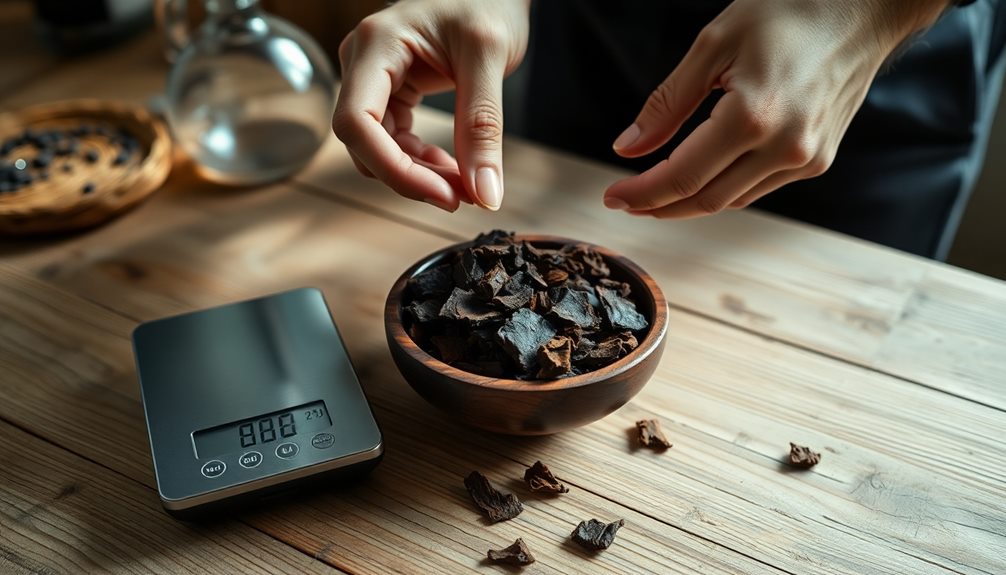
When creating your infusion, measuring agarwood resin accurately is key to revealing its full potential. The quality and concentration of the agarwood essential oil recipe depend largely on the precise amount of resin you use. Too little may result in a weak aroma, while too much can overpower the infusion, masking the subtle notes of this treasured oil.
Additionally, incorporating techniques from the calming properties of Balsam oil can enhance the overall aroma and effectiveness of your blend. To guarantee you achieve the perfect balance, consider these guidelines:
- Use a precise scale: Investing in a digital scale will help you measure the resin accurately, ensuring consistency in your blends.
- Start with small amounts: If you're new to working with agarwood, begin with a lower resin quantity and adjust as necessary.
- Monitor infusion time: The hydro-distillation of agarwood can vary in time, so keeping track of how long you infuse will impact the final product.
- Keep notes: Documenting your measurements and adjustments will help you replicate successful blends in the future.
Step 2. Add Carrier Oil Blend

Creating a balanced carrier oil blend is essential for enhancing the benefits of agarwood essential oil while ensuring it's safe and effective for topical application. When you mix agarwood essential oil for anxiety with a carrier oil, you're not only diluting its potency for safe skin use but also amplifying its therapeutic effects.
Additionally, incorporating calming oils like clary sage can further enhance relaxation and balance in your blend, as the calming benefits of clary sage essential oil are well-documented.
Consider using carrier oils like sweet almond, jojoba, or coconut oil. Each of these oils has its own unique benefits that complement 100% pure agarwood oil. For instance, sweet almond oil is rich in vitamins and ideal for nourishing your skin, while jojoba oil closely resembles your skin's natural oils, making it perfect for absorption. Coconut oil adds a moisturizing element, enhancing the overall experience.
When blending, a good ratio is about 3 to 5 drops of agarwood essential oil per tablespoon of carrier oil. This dilution allows the calming and grounding properties of agarwood to shine through without overwhelming your skin.
With this blend, you can enjoy the holistic benefits of agarwood, whether you're seeking relaxation or relief from anxiety, ensuring your self-care routine is both safe and effective.
Step 3. Infuse for Several Hours
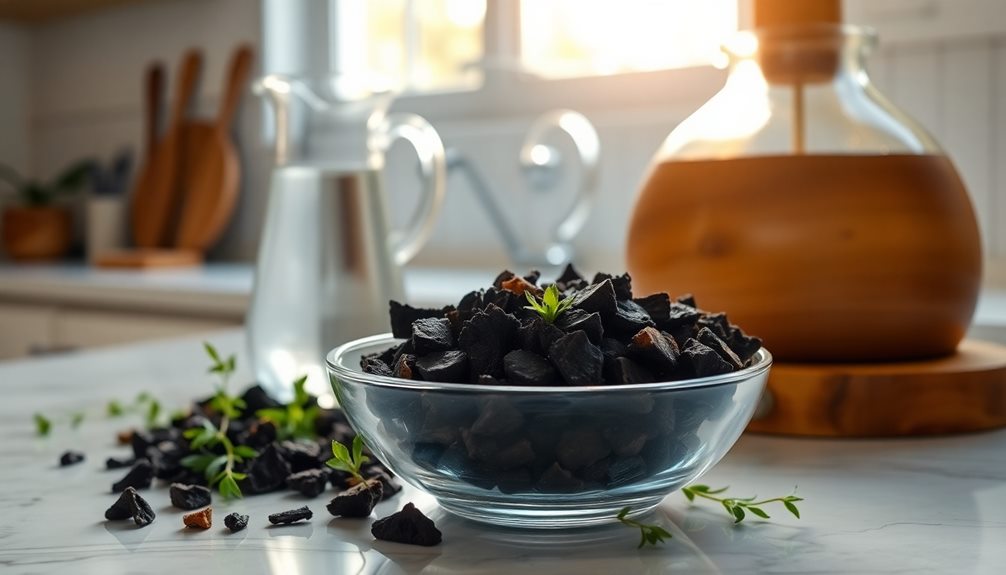
After blending your agarwood essential oil with a carrier oil, the next step involves letting the mixture infuse for several hours. This infusion process is critical, as it allows the carrier oil to absorb the potent properties of agarwood, enhancing its benefits.
You'll find that the aroma deepens, and the oil becomes more therapeutic. Similar to how catnip essential oil benefits are harnessed for relaxation, agarwood can also provide calming effects, making it a versatile addition to your wellness routine.
During this time, consider the various ways agarwood can support your health, particularly its roles in digestive health and traditional uses in Middle Eastern medicine.
As you wait, reflect on these benefits:
- Digestive Support: Agarwood promotes healthy digestion and can alleviate discomfort.
- Aromatherapy: The infused oil can help balance emotions, promoting mental well-being.
- Middle Eastern Traditions: Known as a cardiac tonic, agarwood has been cherished for centuries in various cultures.
- Holistic Healing: This oil isn't just a fragrance; it's a thorough health ally.
Step 4. Strain the Infused Oil
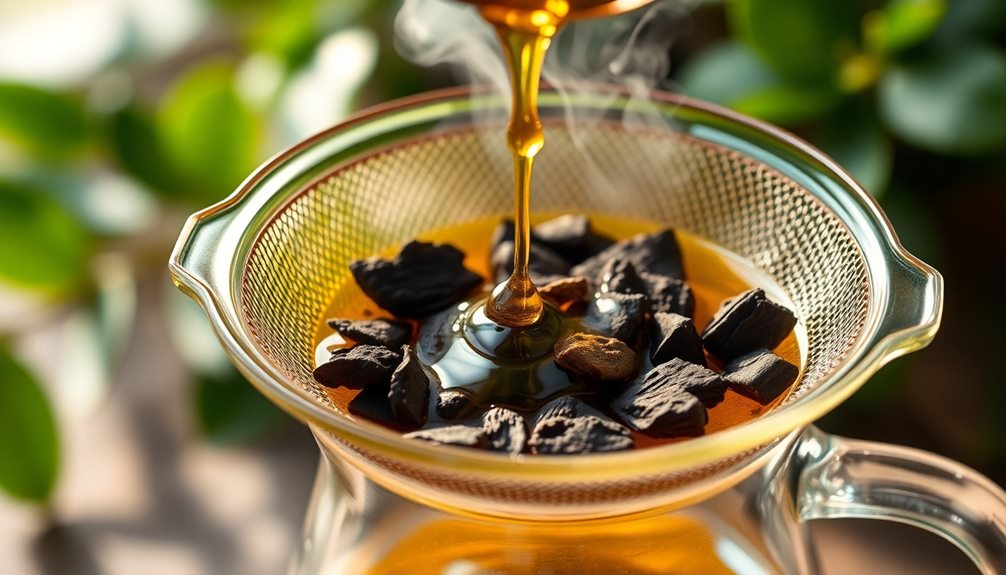
Now that your agarwood essential oil has infused beautifully, it's time to strain the mixture to separate the aromatic liquid from any solid particles.
Begin by placing a fine mesh strainer or cheesecloth over a clean glass container. Slowly pour the infused oil through the strainer, allowing the golden liquid to flow while capturing the remnants of agarwood. You may want to gently press down on the solids to extract every last drop of oil.
The benefits of agarwood essential oil are akin to those of other calming oils, such as chamomile, which is well-known for its soothing properties. What you're left with is pure agarwood oil, a treasure trove of health benefits.
In traditional medicine, agarwood oil is revered for its ability to promote relaxation and balance emotions, making it a popular choice in aromatherapy. Its therapeutic properties are known to alleviate stress, anxiety, and various ailments, reinforcing its status as a natural remedy.
Once strained, store your agarwood oil in a dark glass bottle to protect it from light and preserve its potency.
This way, you'll have a powerful ally for your wellness journey, whether you're using it for its calming effects or unique aroma, all while celebrating the ancient wisdom surrounding the health benefits of agarwood.
Step 5. Agarwood's Aromatic Properties Revealed
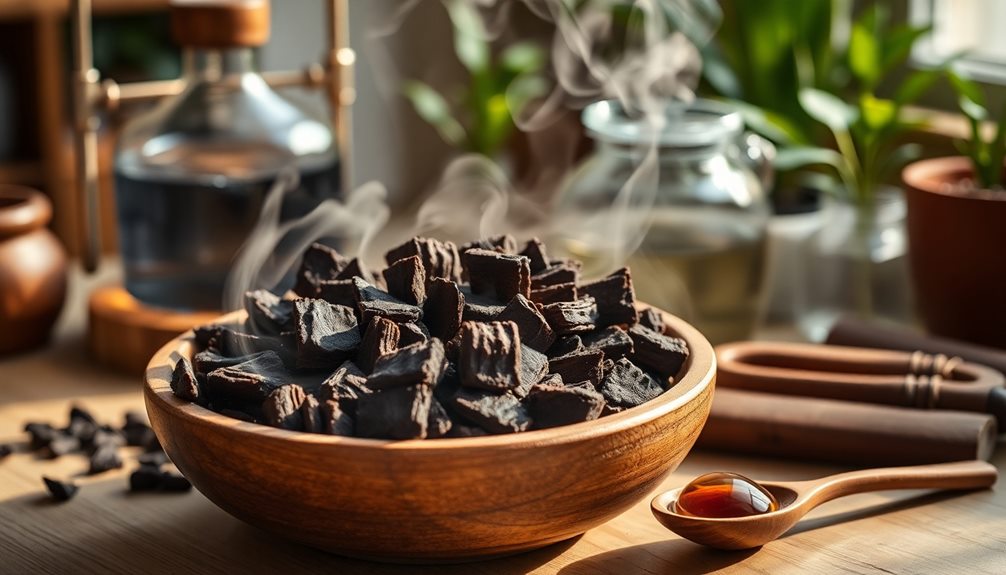
With your agarwood essential oil strained and ready, it's time to explore the enchanting aromatic properties of this remarkable oil.
The unique scent of agarwood captivates the senses, combining earthy, woody notes with a hint of sweetness. This complex aroma not only pleases your olfactory senses but also offers numerous health benefits.
Similar to the calming benefits of Buddha Wood, agarwood is known for its ability to promote relaxation and grounding. When you inhale the fragrance, you might notice its calming effects, making it a sought-after traditional sedative. The soothing aroma promotes relaxation and helps alleviate stress and anxiety.
Additionally, agarwood's therapeutic properties are believed to support liver health, making it a versatile choice for holistic wellness.
Here are some aromatic properties of agarwood essential oil:
- Calming and grounding: Provides a sense of peace and tranquility.
- Antimicrobial: May help purify the air and reduce harmful microbes.
- Mood enhancer: Uplifts emotional well-being and promotes mental clarity.
- Meditative qualities: Ideal for enhancing meditation practices and spiritual rituals.
Final Thoughts
Embracing the rich benefits of agarwood essential oil can transform your holistic wellness journey. This luxurious oil, renowned for its unique aroma, offers a plethora of health advantages, particularly for mental health. As you explore agarwood, remember to exercise caution with agarwood products; verify you choose 100% pure oil to maximize benefits and avoid adverse effects.
Here's a summary of agarwood's key benefits:
| Benefits | Applications | Considerations |
|---|---|---|
| Mental Health | Alleviates anxiety and stress | Consult with a healthcare professional |
| Respiratory Support | Treats respiratory issues | Verify product purity |
| Traditional Uses | Pain relief and digestion | Check for allergies |
| Holistic Practices | Enhances emotional balance | Use with care |
FAQ
What Are the Main Components Found in Agarwood Essential Oil?
Agarwood essential oil primarily contains sesquiterpenes, including alpha-guaiene and beta-agarofurans. These components contribute to its rich aroma and therapeutic properties, enhancing relaxation and promoting overall well-being when used in aromatherapy or topical applications.
Can Agarwood Essential Oil Be Used in Cooking?
You can use agarwood essential oil in cooking, but sparingly. Its rich, complex flavor adds depth to dishes. Make certain you're using food-grade oil, as many products may not be suitable for culinary applications. Enjoy creatively!
How Should Agarwood Essential Oil Be Stored for Longevity?
To store agarwood essential oil for longevity, keep it in a dark, cool place, away from direct sunlight and heat. Use dark glass bottles to protect its quality and prevent oxidation for ideal freshness.
Are There Any Known Side Effects of Using Agarwood Oil?
You should be aware that while agarwood oil offers numerous benefits, it can cause skin irritation or allergic reactions in some people. Always test a small area first, and consult a healthcare professional if unsure.
Is Agarwood Sustainable, and How Is It Harvested?
Agarwood's sustainability hinges on responsible harvesting practices. You'll find that artisans often cultivate Aquilaria trees, ensuring ecological balance while extracting this precious wood. By supporting sustainable sources, you can enjoy agarwood's benefits without harming natural ecosystems.
